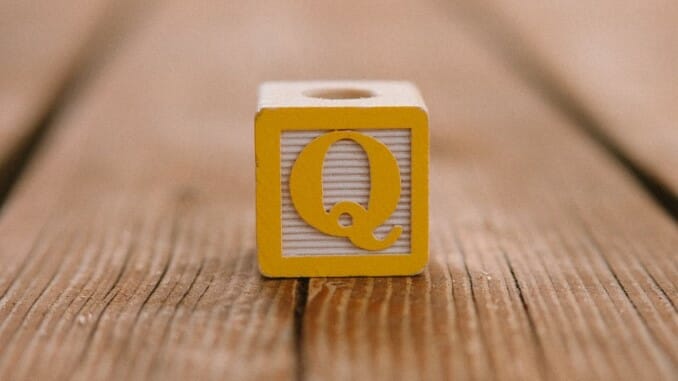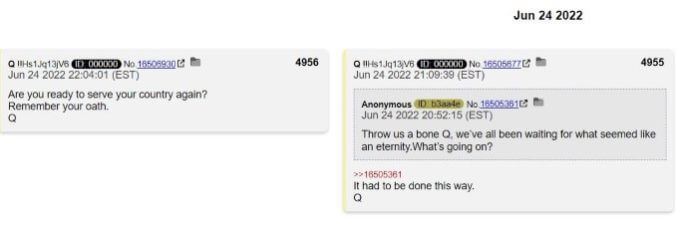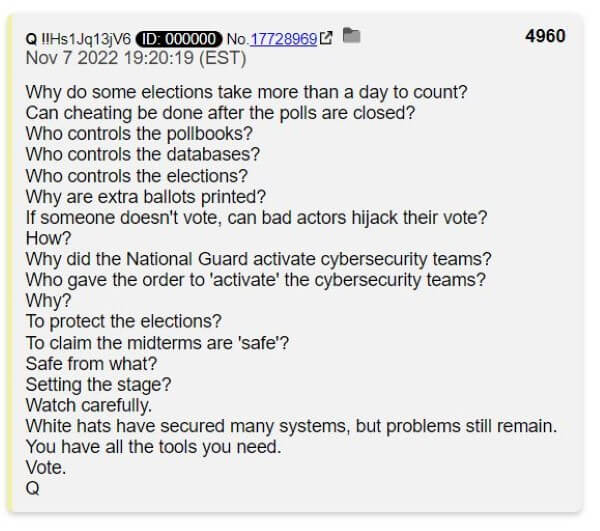Dispatches From Q-Land: Remember When Q Returned … And Nobody Cared?
Photos via Unsplash, Wesley Tingey
Dispatches From Q-Land is an occasional Paste series delving into the seamy underbelly of the QAnon conspiracy theory on right-wing social media platforms such as Parler, Gab, Truth Social and Telegram. It’s a disturbing task, but only by paying attention to these dangerous extremists can we understand the nature of their ever-evolving delusion at any given moment, and hope to understand what they might do next.
The date is roughly eight months ago: June 24, 2022. It’s a Friday evening, and as eager Americans head out for a night on the town, or simply settle in for a night in front of the TV, thousands of smartphones worldwide suddenly chirp at their owners, informing them of an alert that had been programmed years prior. Right wing conspiracy theorists everywhere simultaneously experience the kind of rush of exultation they’ve been mythically building up in their minds ever since December of 2020. Activity on far-right forums and social media platforms such as Parler and Gab rapidly surges. It’s a red-letter day: Q has returned!
Presumably, this is what some sizable percentage of the QAnon-adjacent community—they refer to themselves simply as “Anons”—experienced this past June, when the online account belonging to the conspiracy theory’s original progenitor, the titular “Q,” did indeed cautiously return to life after a very long hiatus. The original Q account had gone dark at the end of 2020, seemingly having no idea how to deal with the confirmation of Joe Biden’s election as the 46th President of the United States. As Donald Trump raged on Twitter against fake voter fraud, and the debacle of Jan. 6, 2020 loomed on the horizon, the person or people behind Q beat a hasty retreat back into internet anonymity, rather than face down the disappointment, confusion and anger of the legions of delusional followers they had helped to indoctrinate. Those people were pissed off, and Q had no answers for them in late 2020. But now in the summer of 2022, Q was back, and ready to again lead the conspiracy hordes as some demented combination of Washington insider and doomsday prophet.

And then a funny thing happened: Nobody really gave a damn. The mainstream media barely acknowledged Q’s return at all after roughly a year and a half absence, which probably shouldn’t be a surprise—most of what has been written about QAnon at major news publications comes from a place so lacking in tech savvy and far-right internet understanding that they wouldn’t even know where to check the original “Q drops” in the first place. But it was far more interesting to see the lack of interest and response that the return of Q ultimately provoked even in the places where the QAnon conspiracy theories were strongest—social media platforms such as Gab and eventually Truth Social, which today reigns as arguably QAnon’s social media home base on the internet. Sure, the account’s return caused an initial hubbub, but there was ultimately far less engagement with the new Q posts than one might expect, and significantly more critical reaction as well. Many doubted the new Q’s veracity, or that it was the same person/people as the old Q. Some felt betrayed by Q’s absence, or countless failed predictions and promises. Even Q seemed surprise by the lack of traction, and after a few typically cryptic pronouncements about topics of the day such as the overturning of Roe v. Wade or the House Jan. 6 committee, Q again went dark.
The Q account was then dark for another 4 months, before returning to life once more in the days immediately before the 2022 Midterm Elections. Like other far-right figures who need to both stoke constant fear and division, and still convince people to participate in the democratic system they simultaneously say is fake and broken, Q railed about voter fraud AND promised people that their votes would still count, thanks to “white hat” agents working to undo the damage of the evil Deep State cabal. It really is quite a thing, to see someone simultaneously make an argument and contradict their own argument in the space of a single post.

Shockingly, this message of “the vote is rigged, but it’s critical that you vote anyway” didn’t really work, particularly among independent voters and political moderates, who overwhelmingly rejected Trump-backed candidates running on platforms built around topics such as voter fraud. On some level, you can probably thank the unpalatable beliefs of these QAnon-adjacent politicians for delivering the most impressive midterm results for an incumbent party in decades.
By the way: One of the candidates who failed most spectacularly in the 2022 midterm primaries? That would be none other than Ron Watkins, known to internet followers as CodeMonkeyZ, and likely the strongest overall contender for the identity of Q himself. The former site administrator of 8kun (along with father Jim Watkins), where the “Q drops” first originated, Watkins tried to run for Congress as a Republican in Arizona’s 2nd District, and ultimately finished dead last in the Republican primary with less than 4% of the vote.
Following the primaries, Q’s posting limped along intermittently for the next few weeks before again sputtering out at the end of November. This round of cryptic posts seemed to perform even worse than the first revival of the account in June of 2022, as even fewer of the influential posters of the far-right internet world chose to amplify Q’s messages. The account hasn’t posted since.
This may all sound like I’m trying to establish cause for celebration—that the QAnon world has crumbled and lost its dangerous potency. Although it is true that the world of Anons is far more fractured than it was a few years ago, with very little central cohesion and constantly conflicting beliefs that tend to limit its members from uniting in any real way, it would be a mistake to equate the diminishment of the original Q account with the “death of QAnon.” Rather, the gradual obsolescence of Q himself speaks mostly to the fact that the QAnon world, which one might also just term the “far right conspiracy world,” has become self sustaining without any need of input from its original founder. The power of this world no longer rests in the hands of Q: It has migrated to a wide network of influential social media posters, “Q influencers” if you will, who reside across a range of different social media platforms.
The tripcode controversy and the lack of see Delta’s act as indicators for chan users that this is not the real Q. However, off the chan boards on platforms like Telegram & Truth Social most influencers are pushing forward with this is Q to support their gifts & communities.
— Marc-André Argentino (@_MAArgentino) June 29, 2022
These are the guys who have usurped Q’s direct influence, and they’re also one of the major reasons that Q’s return fizzled out in such unspectacular fashion, because they made a choice not to amplify him. It’s not difficult to imagine why—in the year and a half that Q was absent following Nov. 2020, many of these influencers on sites such as Gab or Truth Social were able to build very active, devoted followings numbering in the tens or hundreds of thousands of people. Enjoying the influence they wield, and the ability to grift that so often comes with it, these accounts didn’t want any change to the current status quo. They’re perfectly happy serving as a mouthpiece for conspiracies that they don’t actually believe, sponging power, influence and occasionally cash off their followers in their personal internet fiefdoms. Q’s return threatened to lessen their own personal clout, so is it any surprise that many of these guys expressed suspicion that the “new Q” wasn’t legitimate?
At the very least, I think it is fair to say that the fracturing of the QAnon world into many smaller, often warring camps is a positive development overall for the rest of functioning society. Without the focus and specific messaging once provided by their founding leader, Anons have a more difficult time choosing which influencer to believe on any given topic, and the differences of opinion lead to inevitable intragroup bickering. This in turn makes a truly devastating event, such as a coordinated QAnon attack on American democracy, less realistic as a result. That’s certainly better than the alternative of a united group, taking marching orders from an anonymous online leader.
Considering the most likely candidate to be that leader couldn’t get more than 4% of the vote in an Arizona Republican primary, though, perhaps we were all giving Q just a bit too much credit from the beginning. It may be that Q’s fade back into obscurity in the eyes of the online far-right is no more than he deserved.







































